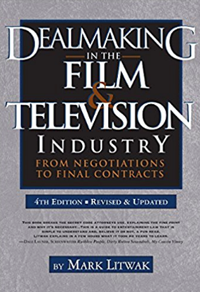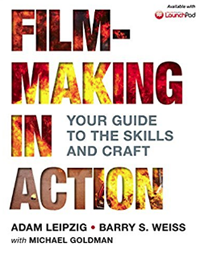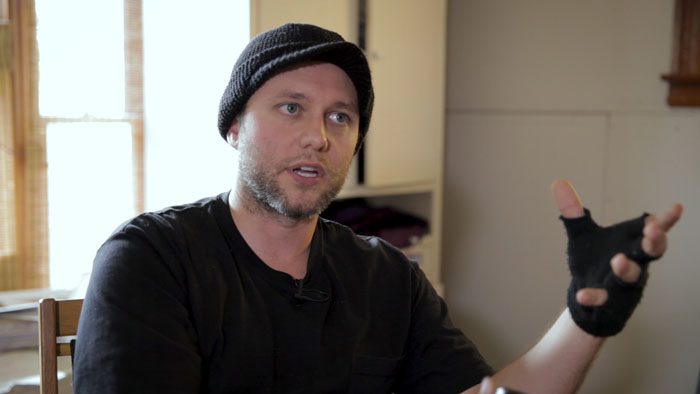
Watch the video interview on Youtube here
Film Courage: And how long have you been first ADing?
Joe Bohn, First AD: Professionally first ADing…a little over 5 years? I moved out from San Francisco (I got my Master’s up there) and one of my associates moved down here as well, booked a first AD job for Miley Cyrus for one of her videos. He brought me on as a second AD.
The producers liked him (but they didn’t want to bring him back) so they brought me back instead. And they started bringing me back over and over again, recommending me to other producers and that’s kind of the history of everything, that’s the history of my career. I just got recommended and just kind of spider-webbed out from there.
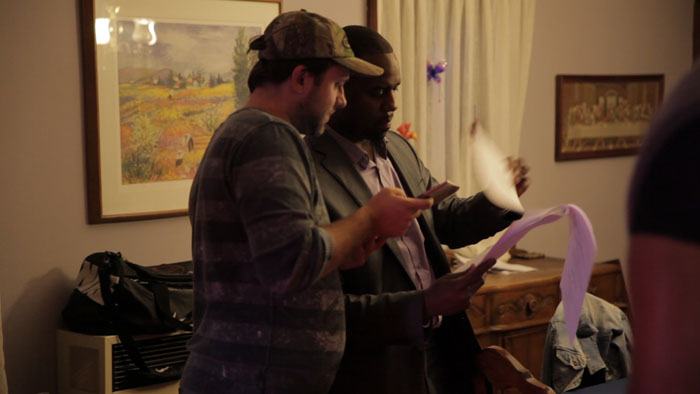
Joe Bohn in-between takes with actor/producer Baron Jay on the set of DEADLY REUNION
Film Courage: And as a first AD what is your…from the minute you get on set, what is your responsibility? What are you looking for at all time?
Joe Bohn: No dead time. I mean fundamentally you are trying to get the greatest amount of quality footage in the can for the director and the production at any given time. And what usually happens on a lot of sets (especially if you don’t have a strong first) is that downtime is where people are ready to work, but no one is telling them to work, no one is telling them to go there and do that.
It almost in some ways feels like babysitting…I don’t want to put down other departments, it’s not like that. But people are waiting to do their jobs. You don’t have a foreman (like on a construction site) waiting to tell them “Okay guys, you need to go in and do this. You need to come out so they can go in and do this,” then no one knows what to do and it’s a lot of people milling around.
So for me as soon as we’re in, as soon as that clock hits 7 o’clock, 8’ o’clock (whatever time your call time is), it is immediately getting every department working on something.
An ideal schedule or an ideal world has every department constantly working on something whether it’s the scene that we’re shooting currently, prepping the next scene, wrapping out the previous scene, any elements like that, that we can do.
We have a B camera that’s not shooting because of the set-up in this particular scene, then let’s get the B camera to go outside and get B roll. Let’s get the house, let’s get the cars, let’s get the sunset, let’s get something. But if people are sitting around doing nothing, then that becomes an issue that should be rectified in an ideal world.
Watch your ears real quick [Joe prepares crew and actors for upcoming scene] “Nine minutes guys! Nine minute warning.”
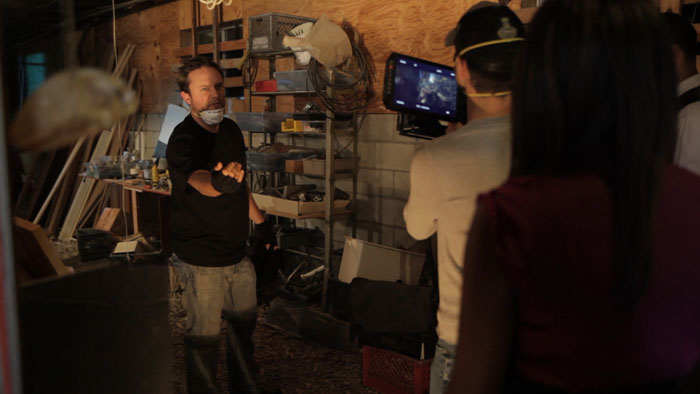
Film Courage: So as a first AD you’re almost never resting while on set? It sounds like you’re always looking for the next step and doing two things at once?
Joe Bohn: Yeah, as a first AD if you’re resting, I’m not sure you are working? I don’t know how that works?
Look on your bigger budget stuff where you have a second AD, a second second, multiple second seconds, key PA, PA, when you have all this personnel and all these resources at your disposal, sure you can step off set and relax. If you smoke, have a cigarette, whatever the case may be. But if you are working in the let’s say under $250,000 budget range, you just don’t have the personnel underneath you to support you in that kind of way and in order to keep the film moving at a pace that usually (again at those budget levels) it needs to move, you have to be on at all times. You don’t step off set to 10:1 to use the restroom. You step off set to 10:1 to grab a bottle of water and come back and theoretically if you’ve got a PA, you radio them and they get you the water. Because every second that you step off is a second that someone may not be working or things may not be moving forward. Those seconds add up over the course of a day and certainly over the course of a long shoot. And what they add up to is shots you couldn’t get, set-ups you couldn’t grab, performances that couldn’t be tweaked because you didn’t have time and that time gets lost…yes because other people weren’t doing their jobs but fundamentally you weren’t there to supervise them and have them continue to work through that.
Film Courage: Challenges for a first AD on set and how you work around it?
Joe Bohn: Challenges for a first AD on set and how you work around it? Well, that’s the challenge in and of itself. Each film set inherently comes with its own variables and its own issues. It would be very easy to be like “Oh, well the problems are X, Y and Z and this is how you solve them.” Unfortunately that’s not the situation. Certainly in this industry, but specifically as a first AD.
You have to first and foremost evaluate what your resources are and resources refer to not only just what you psychically have but your personnel as well.
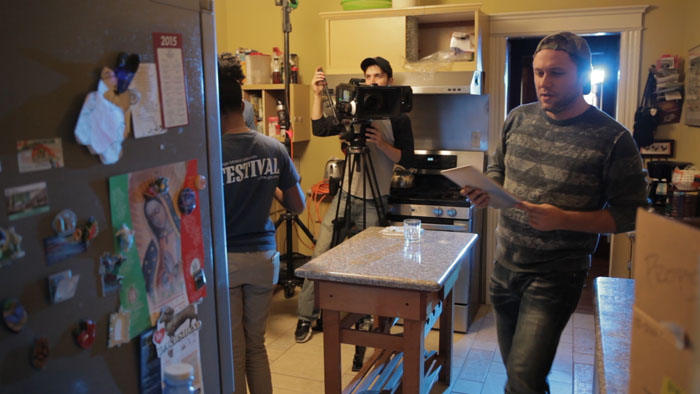
Do I have five people or do I have one? That’s going to change the problems you are going encounter and how you can solve them. Ideally you are solving those problems before you get to them, but maybe you’re not.
And then obviously the psychical resources of your equipment, money, the house, what time can we shoot, fighting the daylight (if you’re outside), that kind of stuff.
So in terms of common problems…I think really the most common problem you are always going to run into is personality. You have people with egos or not with egos, people that are hard to work with or easy to work with, but they are green, they are not experienced, they want to learn. So you have to teach on set as you go along.
It’s really…fundamentally it’s not about being the first AD that you think you should be. It’s about being the first AD that this particular production, these particular people, need you to be. I think that’s the problem that a lot of people who take this position is that they come in…the know the rules, they know the regulations, they know how to do the job, but they approach every job the same. And in doing so, you can’t fit a square peg in a round hole. You have to be malleable and take those first few days to figure out what this needs and how to work with people. And if you can do that and adapt quickly and efficiently, then hopefully you minimize those problems that you are talking about.
Film Courage: For you…when you first step on [set]…let’s suppose you are going to have a 17-day shoot at what point do you find…that you get this gut-level “Okay…I think this is where the issues are going to be.” Not specific people (maybe, maybe not), but where do you get the temperament of the set? When does it start to reveal itself to you?

Joe Bohn: I think by Day 2. I think if you are really paying attention probably really (honestly) by lunch on Day 1. Because it’s very easy to see “Okay, he’s got a chip on his shoulder, he doesn’t communicate well, and she’s…” You can really kind of get that pretty quickly. But if haven’t figured out by Day 2, then you’re not going to figure it out (you’re just not). At that point it should have revealed itself.
Now in a 17-day shoot, if you’re moving from a location-to-location maybe new problems arise in that sense where you are in this location but this location is super strict. They want padding down on the floor, they want layout board, ram board, and they want this, that and the other. So you have to discover those problems and then change and acclimate to them extremely fast because you don’t have the two days previously to kind of build up to it and work out a scheme or a plan to make it work. So that’s the biggest thing.
Otherwise yeah…if you are paying attention and you’re on set and you are working with people and you are listening and communicating, I think you find out by the end of the first day, really. No later than the end of the second.
Film Courage: I get the sense that you are really good at reading people. That you just have this innate thing where you can figure what someone needs, where they need to be lead, am I right with that? You have a really quick sense with that?
Joe Bohn: Yeah, I think I do. I think I have a really quick sense to read people. It makes me as valuable and as good at the job as I am (I hope it does). I think without that it becomes much more difficult to do the job effectively as I want to and I strive to do it…(Watch the video interview on Youtube here).
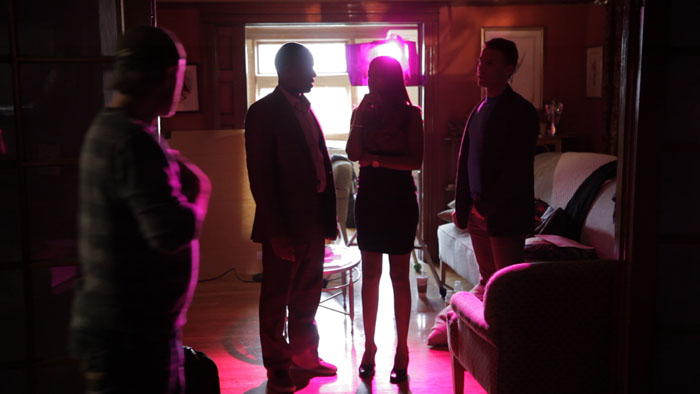
CONNECT WITH JOE BOHN
IMDB
Thank you to producers Baron Jay, Michael Joseph and James Cullen Bressack for this behind-the-scenes look at DEADLY REUNION. For more information on the film, please visit IMDB.
Advertisement – includes affiliate links
FILMMAKING IN ACTION: Your Guide to the Skills and Craft
https://amzn.to/2naBMVd
Inside Track for Independent Filmmakers:
Get Your Movie Made, Get Your Movie Seen
https://amzn.to/2Gg3Xeu
Check out the 2017 Top 25 Most Read Articles on Film Courage here





